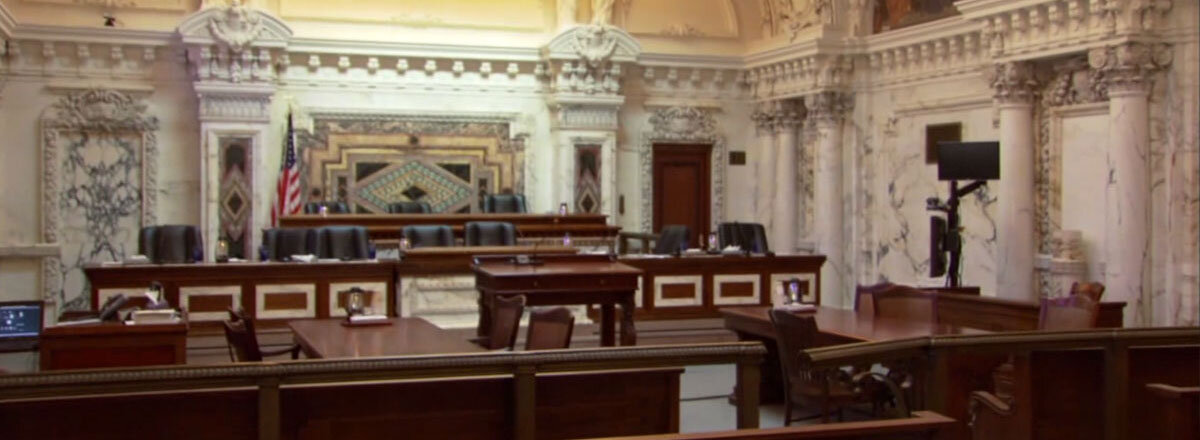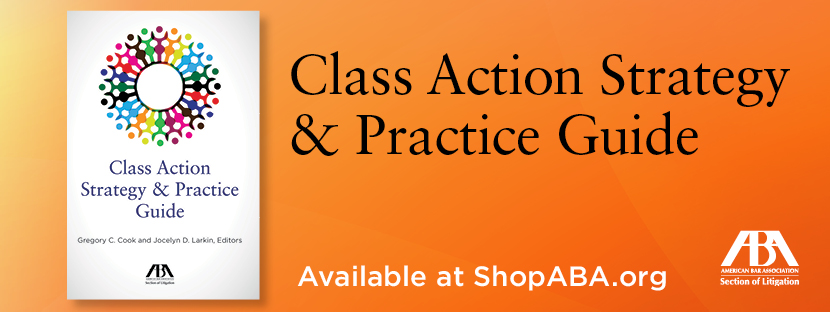
PRACTITIONER BLOG
Read our analyses of developments in Impact Litigation and stay current on class action law

Ninth Circuit Nixes "100% Natural" Wesson Oil Class Action Settlement; Finds Collusion On Attorney Fees
The court held that the class settlement—one it characterized as “reek[ing] of collusion at the expense of class members”—featured three “red flags” identified in Bluetooth. First, Plaintiffs’ counsel received a disproportionate share of the settlement—almost $7 million—while the class received less than $1 million. Further, the settlement provided for no direct notice to class members, reducing the redemption rate. Second, the parties agreed to a “clear sailing arrangement” in which ConAgra agreed not to challenge the agreed-upon fees for class counsel. This created the possibility that Defendant agreed to pay class counsel excessive fees in exchange for counsel accepting a lower amount for class members. Third, the agreement included a “kicker” or “reverter” clause in which ConAgra, not the class members, would receive a reversion of excess fees if the court reduced the agreed-upon attorney’s fees.

Impact Fund and Amici: Ninth Circuit’s New “De Minimis” Standard for Predominance Is Wrong and Disadvantages Workers
Our brief argues that the panel’s decision is inconsistent with decades of Supreme Court and Ninth Circuit precedent regarding class certification and trials challenging employment discrimination and other workplace violations, such as wage theft. To require plaintiffs to demonstrate no more than a “de minimis” number of uninjured class members at the class certification stage forces district courts to engage in a full-blown inquiry into the merits of the case, an inquiry which the Supreme Court and the Ninth Circuit have repeatedly stated courts are expressly forbidden to undertake at that stage.

Uninjured Class Members - How Many Is Too Many? Ninth Circuit Weighs In On Class Action Article III Standing
So how exactly does Article III work in a class action? It is generally understood that, at the outset of a class action, Article III standing is determined based on the claims of the named plaintiffs. At the tail end, if the case goes to judgment, unnamed class members must prove an Article III injury in order to receive damages. But what about in the middle of the case? What about at class certification?

Impact Fund Sponsor Huntington Bank serves in pro bono role for Flint Water Crisis Settlement
In early 2021, a $641 million settlement between the residents and businesses of Flint and various government defendants received Preliminary Approval by the Court. Nearly 90,000 Flint residents were impacted by the Flint water crisis, and the settlement will create a compensation fund to help those affected, predominantly children. Huntington Bank, selected by Special Master Deborah Greenspan, is working with Counsel, the Claims Administrator, and the Court in support of the settlement fund for the victims. As a leader in the community, Huntington volunteered to serve as escrow agent and distribution bank on a pro bono basis. Huntington has also committed to partner with local leaders and community organizations to identify financial and socioeconomic barriers faced in the region.

Real People, Real Checks! Class Members Tell Us What It Means To Them
Settlement checks can add up to a significant amount. Some of the regular viewers on our website, Top Class Actions, know this to be true. These awesome individuals, our biggest fans, write to tell us about how they were able to qualify for enough settlements to recoup $1,000 or $3000, $4,000 a year. That's a lot of money for most people. It reminds me that when we’re engaging with communities on social media, like our teachers who live paycheck to paycheck, we are saying to them: This is your money—submit your claim!

How COVID-19 is Changing the Class Action Landscape
Class actions are on the rise, and many class action practitioners predict that it will continue to grow because of the COVID-19 pandemic. In fact, as of this past December, over 1,400 class actions related to losses tied to the pandemic were filed and the number will only continue to increase. Filed cases span the country with the most cases currently being filed in California, Illinois, New York, and Florida. The amount of class actions that may result from the pandemic are almost endless. It is certain that courts will see an increase in the ‘failure to refund’ cases, since this issue affected several different groups of consumers. However, other classes could pop up in the courts over the next year or so.

Impact Fund Supports Groundbreaking Class Action Litigation For Colorado's Transgender Prisoners
In Colorado’s prisons, trans women have been fighting to survive and fighting for their rights for years. Kandice Raven lives with permanent injuries that she sustained in multiple severe beatings carried out by groups of transphobic men. Jane Gallentine has been trafficked, treated as property and repeatedly sexually abused, including by one man who tattooed his name on her neck to convey “ownership,” and by another man employed as a prison guard. Amber Miller has again and again requested officials’ help in escaping her abusers and found that the only way to get a response is to break prison rules or engage in self-harm to keep herself safe. In response to their fearless self-advocacy, the Colorado prisons have responded by transferring Kandice, Jane, and Amber to a series of more and more restrictive—and more and more dangerous—prisons and prison units.

Impact Fund & Amici to Eleventh Circuit: Eliminating Service Awards Endangers Class Actions
A recent decision by the Eleventh Circuit Court of Appeals stunned the class action and civil rights community. In Johnson v. NPAS Solutions., LLC, 975 F.3d 1244, a 2-1 majority ruled that service awards for class representatives in class actions are categorically unlawful.On October 29, the Impact Fund filed an amicus brief calling on the full Eleventh Circuit to review the decision en banc. Our amicus brief on behalf of civil rights groups argues that service payments and incentive awards appropriately compensate plaintiffs for the considerable responsibility they undertake in class action cases and on behalf of fellow class members.

SNAP! Impact Fund and Western Center on Law and Poverty File Class Action Lawsuit Against USDA For Denying Emergency Food Assistance To Californians With Greatest Need
On May 21, 2020, the Impact Fund and the Western Center on Law and Poverty filed a class action lawsuit in federal court in San Francisco against USDA and Secretary of Agriculture Sonny Perdue, alleging that USDA is illegally denying emergency food aid to the poorest households in California. We argue that USDA is misinterpreting the Families First Act in violation of the Administrative Procedure Act. “The idea that people who were already struggling to get by before the crisis should not receive the additional help being granted to other SNAP recipients is cruel and absurd,” said Alexander Prieto, a senior litigator for Western Center on Law & Poverty. “It goes against the intent of the Families First Act, which is why we are seeking relief for our clients.”

Sixth Circuit Ruling Restricts Imposition of Arbitration
A recent Sixth Circuit decision, Taylor v. Pilot Corp, broadly reaffirms that an agreement to arbitrate must be just that—an agreement. It suggests that questions about the formation of that agreement must be decided by a court—not an arbitrator. And it reaffirms the courts’ power to supervise discovery going to the question of contract formation without interference from appellate courts or arbitrators.

Answering Question Left Open by SCOTUS, D.C. and Seventh Circuits Side With Plaintiffs on Specific Personal Jurisdiction in Class Actions
In quick succession last week, the D.C. and Seventh Circuits handed down two decisions favorable to class action plaintiffs on specific personal jurisdiction in federal court. So, good news for plaintiffs today, but these cases are not the last we will hear on this subject.

Ninth Circuit Rules on Article III Class Action Standing in Favor of Plaintiffs in Ramirez v. TransUnion
Given the issues, I expect the defendant will be filing en banc and cert petitions. While the buzz on the case is on punitive damages, I think the Article III standing issues will be the heart of future disputes. The first piece of good news is that the facts in the case are very sympathetic for the plaintiffs, which will be helpful going forward. In brief, TransUnion incorrectly placed terrorist alerts on the front page of consumer credit reports for approximately 8000 individuals.

Appeals Court: D.C. Must Better Integrate People with Disabilities into their Community, Upholds Class Action Remedy
Last month, the Court of Appeals for the D.C. Circuit decided Brown v. District of Columbia, 928 F.3d 1070 (D.C. Cir. 2019), in favor of a class of about 1,000 residents of D.C.-supported nursing facilities who are seeking transfers to community-based care. The class alleged that the District failed to transition them out of the public institutions in violation of the Americans with Disabilities Act (ADA) and the Rehabilitation Act, which prohibits discrimination against persons with disabilities by programs receiving federal assistance (here, Medicaid, which helps fund the nursing facilities).

Impact Fund and Allies File Amicus Brief to Preserve Workers’ Right to Bring Class Actions Under the ADA
Workers discriminated against on the basis of disability must be allowed to join together and use class actions to pursue workplaces free of discrimination, just as Congress intended when it passed the ADA.

Class Action Strategy and Practice Guide: A Must-Have For All Class Action Attorneys
Class actions involve decisions on strategy at every turn. The positions of the parties are constantly changing and counsel must always be looking ahead and, at the same time, carefully watching their flank. This book helps all practitioners and parties identify, analyze and answer key strategy questions. Ever evolving class action tactics, case law and rule make this insightful practice guide a must read for lawyers, judges, advocates and decision makers at every level.

Toothless Rights: How Forced Arbitration and Class Action Waivers Undermine Civil Rights at Work
Class and collective action empowers those that share the same experiences and injuries to stand together and assert their rights as a group, and they are critical to achieving widespread, systemic change. Class action waivers in mandatory arbitration agreements can erase all of these benefits, requiring employees to pursue their claims through individual arbitration.
But a series of Supreme Court decisions since the early 1980’s has largely sanctioned and accelerated the propagation of forced arbitration, including agreements that prohibit class litigation.

Amendments to Class Action Rule 23 Now in Effect: Objectors Beware!
The amendments to the to the federal class action rule were set to take effect December 1, 2018 subject to Congressional action – rejection, modification, or deferment. That deadline passed without the legislature’s response. As a result, these proposed are now in effect, marking the first substantive update to Rule 23 in fifteen years.

Why “Ascertainability” in Class Actions Matters: How a Kiddie Pool Could Threaten Workers’ Rights in California.
The heightened and burdensome standard for ascertainability articulated by Sotelo and applied in Noel v. Thrifty Payless, Inc. will prevent meritorious employment class actions and undermine workers’ rights. This result is at odds with California’s strong public policies favoring the class mechanism and the robust enforcement of workers’ rights.

A question for Microsoft: How many #MeToo’s does it take?
Sworn statements explained how women at Microsoft are undervalued in comparison to men, are denied opportunities that men receive, are left out of important meetings, and work in a sexualized environment in which male employees stare at women’s breasts, grope them, and comment on their bodies and clothes. One woman explained the pressure that she and other women feel to “hit the sweet spot between being perceived as ‘too timid’ or ‘overly passionate’ and ‘too harsh’ in Microsoft’s male-dominated culture.” Her male manager lowered performance ratings for her and the team of women she supervised because he believed they did not “smile enough.”

SCOTUS Rules on Class Action Tolling in China Agritech, Inc. v. Resh
The Court’s decision, in our opinion, is a grave departure from the goals of efficiency and economy inherent to class actions. Requiring plaintiffs to preemptively file multiple actions unnecessarily burdens the judiciary and clogs the system with duplicative cases. The Court’s decision also is at odds with what we regard as the reality of modern class actions in that many do not have a final decision on class certification within two or four years, for reasons outside the named plaintiff’s control. Necessary discovery, taxed courts, appeals, and recalcitrant defendants all slow the process and often prevent the parties from obtaining a final ruling on class certification within the first few years. In addition, orders denying class certification may identify remediable issues that can be addressed only by filing a new action. This week’s ruling prohibits plaintiffs who initially timely filed their case from filing those new actions if the court’s class certification order arrives outside the original statute of limitations.
